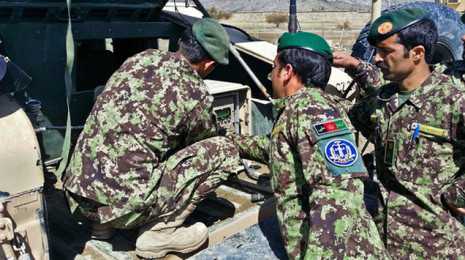Afghan soldiers use new tech to defeat IED threat
Szöveg: honvedelem.hu / isaf.nato.int | 2014. április 21. 6:03Spartan brigade soldiers helped graduate 59 Afghan soldiers of Route Clearance Company, 1st Brigade, 203rd Corps of the Afghan National Army, from an anti-Improvised Explosive Device system training class, April 2, 2014, at Camp Parsa,Khost Province, Afghanistan.
“The intent is for the Afghan forces to be able to teach themselves how to use the system. All of the training we have been doing with them in the past few months has been geared to do that," said U.S. Army Capt. Luke Plante, a native of Windsor Locks, Conn.
Plant is the 3rd Brigade Combat Team, 10th Mountain Division’s electronic warfare officer. Plante, along with U.S. Army 1st Lt. Taylor Kilmer, the executive officer of the 4th Battalion, 25th Artillery Regiment, 3BCT, are responsible for providing tactical expertise as well as coordinating the training.

Soldiers of the Route Clearance Company, 1st Brigade, 203rd Corps of the Afghan National Army, go through the operating procedures of their vehicle – mounted Symphony counter – Radio Controlled Improvised Explosive Device system during a class at Camp Parsa, Afghanistan.
IEDs have been deployed by insurgents against both the Coalition and Afghan security forces for years, but their technology has advanced. Although the devices are still made of whatever materials insurgents can re-purpose, the methods of triggering them have changed in an effort to increase their effectiveness. One of the more insidious methods is initiating the IEDs using wireless control devices, such as cell phones. The Symphony system is designed to defeat those devices from a safe distance, while on the move.
“RCIEDs are radio controlled improvised explosive devices, which basically use the electromagnetic spectrum, particularly radio waves to initiate them. The Symphony system overpowers those systems so they can’t be initiated," said Plante.
The soldiers received approximately an hour and a half of classroom instruction and six hours of hands –on training on the system. To successfully graduate from the course, the students had to physically demonstrate how to power-up the system, set it up and then correctly shut it down, which they were all able to so.
“The field service representative commented that not a single mistake was made. There were a couple of minor hesitations, but no one made a mistake," said Plante.
The Symphony counter-RCIED system is among the latest additions to the growing list of critical yet supportable capabilities which are giving the Afghan forces the confidence they need to meet their mission requirements, especially when the last of the U.S. forces leave Afghanistan.
“It’s a capability we can leave with the Afghans that can give them sustainability once we leave as well as gives them increased force protection capabilities for operations. Everything we leave behind, we want it to be sustainable for them," said U.S. Army Maj. Ryan Mayfield, the 3BCT’s fire support officer.
Mayfield, a native of Culver, Ind., is confident the Symphony system gives the Afghans a technology they can use to take their growing tactical abilities into the future.
“I think the system will make a difference. Their route clearance efforts, by their own understanding of the terrain and environment, are very successful by their definition but it is a system which gives them the ability to defeat radio controlled IEDs which brings them confidence," said Mayfield.
Plante said the ability to sustain the program begins with focusing on transitioning the training responsibility from the U.S. to the Afghans from the start.
Approximately 10 classes have been taught at forward operating bases throughout the Spartan brigade’s area of responsibility with more to come.